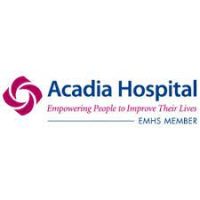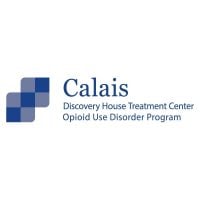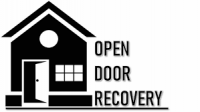
Acadia Hospital
Drug Rehab Center in Bangor, Maine
- Mental Health
- Eating Disorder
- Dual Diagnosis
Acadia Hospital in Bangor, Maine provides mental health and dual diagnosis treatment services through evidence-based models, individualized treatment plans, and a range of therapies, striving to empower individuals to reach their full potential and lead fulfilling lives.
About
Acadia Hospital in Bangor, Maine is a leading provider of mental health and dual diagnosis treatment services. They offer comprehensive inpatient and outpatient programs to assist individuals struggling with mental health and addiction issues. Their experienced and compassionate practitioners employ evidence based models and use a variety of methods and treatments to create individualized treatment plans for each patient. These include eating disorder treatment, electroconvulsive therapy, group and individual therapy and cognitive behavioral treatment. In addition, they offer nicotine replacement therapy (NRT) and trauma therapy for individuals with dual diagnosis.
Acadia Hospital is accredited by The Joint Commission and accepts private health insurance. They strive to provide the best quality care possible while respecting their patients’ rights and dignity. Their staff is dedicated to creating a safe and supportive environment, helping patients build skills, support networks and develop strategies to manage their mental health and addiction issues. All of their services are designed to empower individuals to reach their full potential and lead a fulfilling life.
Genders
Ages
Modality
Additional
Accreditations

JCAHO
Conditions and Issues Treated
Dual-Diagnosis
A person who struggles with addiction and a mental health condition suffers from a dual diagnosis. This means that they have two issues that must be treated. The specific mental health issues that the patient at Acadia Hospital might have include but are not limited to:
- Depression
- Bipolar Disorder
- Anxiety
- PTSD (Post Traumatic Stress Disorder)
The specific addiction issues that the patient might have include but are not limited to:
- Alcoholism
- Drug Addiction (i.e., Cocaine, Meth, and other stimulants, Marijuana, and Ecstasy)
The combination of the two illnesses can be tough to treat. Taking care of one or the other is tough, and taking care of both cannot be done alone. A patient who receives dual diagnosis treatment will be given the best chance at becoming sober.
Dual Diagnosis (Co-Occuring Disorders), Mental Health
Levels of Care Offered
This center offers a variety of custom treatment tailored to individual recovery. Currently available are Dual-Diagnosis, Inpatient, Outpatient, with additional therapies available as listed below.
Inpatient Treatment Program
Inpatient treatment centers offer a safe, secure, and often medically supervised environment for drug or alcohol-addicted individuals. Many of these facilities are equipped to provide detoxification, treatment for co-occurring mental health disorders, and aftercare programs.
The patient typically spends 28 to 30 days at the facility and will receive extensive drug counseling. They will also learn how to live without drugs and how to make the right decisions in life.
Bangor, ME Outpatient Program
An outpatient treatment program is set up to help with alcohol or drug addiction or a co-occurring disorder. The treatment must attend the treatment facility for their therapy and other programs but return home each night. The frequency of mandatory attendance decreases after much of the treatment program is complete. The treatment programs are monitored by the treatment facility and case managers who work for a judge or judge’s office. A treatment program may be performed out of a treatment facility, treatment clinic, or treatment center.
The benefits of outpatient treatment programs are many. One of the most beneficial treatment programs is that it allows treatment for clients who cannot afford or may not be able to attend treatment at a treatment facility, treatment center, or treatment clinic full-time. Another benefit of treatment programs is that they reduce crime rates because treatment allows people to treat their addiction.
Therapies & Programs
Individual Therapy
Individualized Treatment is essential because it gives addicts the ability to participate in a program that meets their unique needs. An addict should work with professionals who understand what they’re going through, especially if the addict is actively using. Finding the right treatment program for an addict is difficult, but it’s even harder without communicating with those who have experience treating your specific situation.
Group therapy sessions provide recovering addicts with a chance to cope with everyday situations that many face. Group therapy sessions are held in rehab facilities, clinics, churches or community centers that offer drug addiction treatment.
People who attend these groups are encouraged to voice their feelings and support other addicts in recovery. This helps group members strengthen their own recovery program while cheering on others who are struggling with sobriety.
Trauma therapy allows them to work through past trauma to have peace of mind and begin down the road of sobriety. The therapist will work with the individual to help them understand their past and present relationships. Patients may often believe that something is inherently wrong with them or they are unworthy of love. The therapist aims to correct these negative feelings and behaviors by helping the person realize that their actions do not reflect who they truly are.
Rational Emotional Behavior Therapy (REBT) was developed by Dr. Albert Ellis in 1955. The therapy is based on the premise that our beliefs lead to and maintain our emotions and behaviors. It does not incorporate the use of medications or supplements. Instead, REBT focuses on helping people understand, respect, and accept their feelings without judgment.
Cognitive Behavioral Treatment (CBT), Dual-Diagnosis, Eating Disorder Treatment, Electroconvulsive Therapy, Group Therapy, Individual Therapy, Inpatient Treatment, Nicotine Replacement Therapy (NRT), Outpatient Treatment (OP), Residential Long Term (>30 Days), Trauma Therapy
Payment Options Accepted
For specific insurance or payment methods please contact us.
Is your insurance accepted?
Ask an expert, call (888) 674-0062
Additional Details
Specifics, location, and helpful extra information.
Bangor, Maine 4402 Phone Number(207) 973-6100 Meta DetailsUpdated November 25, 2023
Staff Verified
Patient Reviews
There are no reviews yet. Be the first one to write one.
Bangor, Maine Addiction Information
Prescription opioid abuse is the most common form of substance abuse in Maine. More than 10% of these residents have also admitted to using prescription drugs for non-medical purposes. Between 2013 and 2014, 4 out of every 5 deaths in Maine were caused by illicit drugs. One in five high school students in Maine uses marijuana every single month.
Bangor, ME, has a moderate drug addiction problem, according to the most recent National Survey on Drug Use and Health (NSDUH). In 2018, there were 354 drug fatalities in Maine, compared with 417 in 2017. There are twice as many drug-related emergency room visits in Bangor, ME as the national average. Inpatient rehab in Bangor includes a variety of programs such as extended care and transitional housing.
Treatment in Nearby Cities
- Charleston, ME (22.8 mi.)
- Lincoln, ME (39.5 mi.)
- Fairfield, ME (44.1 mi.)
- Augusta, ME (61.3 mi.)
- York, ME (148.2 mi.)
Centers near Acadia Hospital



The facility name, logo and brand are the property and registered trademarks of Acadia Hospital, and are being used for identification and informational purposes only. Use of these names, logos and brands shall not imply endorsement. RehabNow.org is not affiliated with or sponsored by Acadia Hospital.





